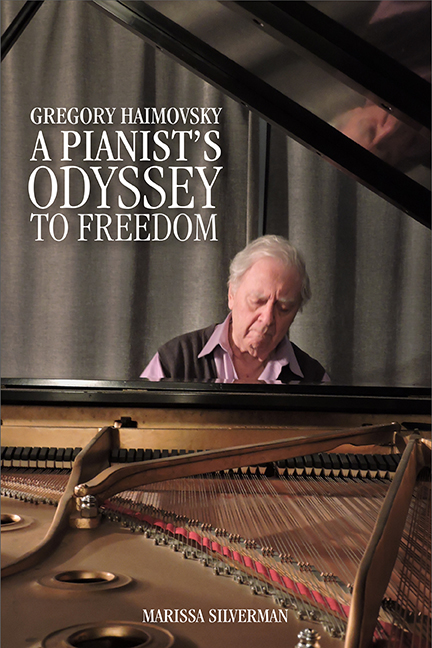Book contents
- Frontmatter
- Dedication
- Contents
- Acknowledgments
- Introduction
- 1 A Pianist Is Born
- 2 A Concert Pianist in Exile
- 3 Spirituality, Love, and Color: Understanding Messiaen’s Music
- 4 From Thaw to Frost: Neonationalism and the Messiaen Premieres in the USSR
- 5 Haimovsky and Grazhdanstvennost’
- Appendix 1 Selected Performances of the Music of Olivier Messiaen by Gregory Haimovsky, 1964–72
- Appendix 2 Selected Writing by Gregory Haimovsky on the Music of Olivier Messiaen
- Notes
- Index
2 - A Concert Pianist in Exile
Published online by Cambridge University Press: 04 June 2021
- Frontmatter
- Dedication
- Contents
- Acknowledgments
- Introduction
- 1 A Pianist Is Born
- 2 A Concert Pianist in Exile
- 3 Spirituality, Love, and Color: Understanding Messiaen’s Music
- 4 From Thaw to Frost: Neonationalism and the Messiaen Premieres in the USSR
- 5 Haimovsky and Grazhdanstvennost’
- Appendix 1 Selected Performances of the Music of Olivier Messiaen by Gregory Haimovsky, 1964–72
- Appendix 2 Selected Writing by Gregory Haimovsky on the Music of Olivier Messiaen
- Notes
- Index
Summary
You only have power over people so long as you don't take everything away from them. But when you’ve robbed a man of everything, he's no longer in your power—he's free again.
—Aleksandr Solzhenitsyn, The First CircleIn late August of 1950, Haimovsky left Moscow for Kalinin. As depressed and hopeless as he felt about his exile, he was grudgingly thankful that only a five-hour train ride separated him from Moscow. In Kalinin—a small, godforsaken city ravaged by the war—where professional and cultural opportunities were almost nonexistent, Haimovsky rethought many aspects of his life, and reexamined his values. And remarkably, living in the middle of nowhere, he began to gain a real, in-depth knowledge of Russia and its people. In hindsight, his years in Kalinin marked the beginning of his personal resurrection and his long journey to the West.
Living and Teaching in Kalinin
The citizens of Kalinin suffered severely during and immediately after World War II. “The picture of urban life in the immediate postwar period in Kalinin province,” writes historian Kees Boterbloem, “is bleak. The sacrifices made before 1945 had been extreme, and the deprivations continued after the war.” Stale bread and some canned goods were the only things to eat, but, of course, vodka was plentiful.
Early on Sunday mornings, large crowds of residents stormed the train station to catch a ride to Moscow. Traveling at a slow speed, steam-powered trains took a protracted time to reach the capital city. Exhausted working people, many of whom labored on Saturdays, slept through the trip. They hoped against hope that they would be able to find and purchase the most basic staples. If successful, they returned to Kalinin with everything they could afford to buy for their families, who lived in misery.
The return trip in the evening began with an epic loading of the train cars. The cries of the conductors, mixed with the whistles of policemen, were drowned out by the roar of the crowds that thronged the cars. Swollen with purchases, people's paper bags would break, especially when the bags contained unsealed meat.
- Type
- Chapter
- Information
- Gregory HaimovskyA Pianist's Odyssey to Freedom, pp. 49 - 69Publisher: Boydell & BrewerPrint publication year: 2018

